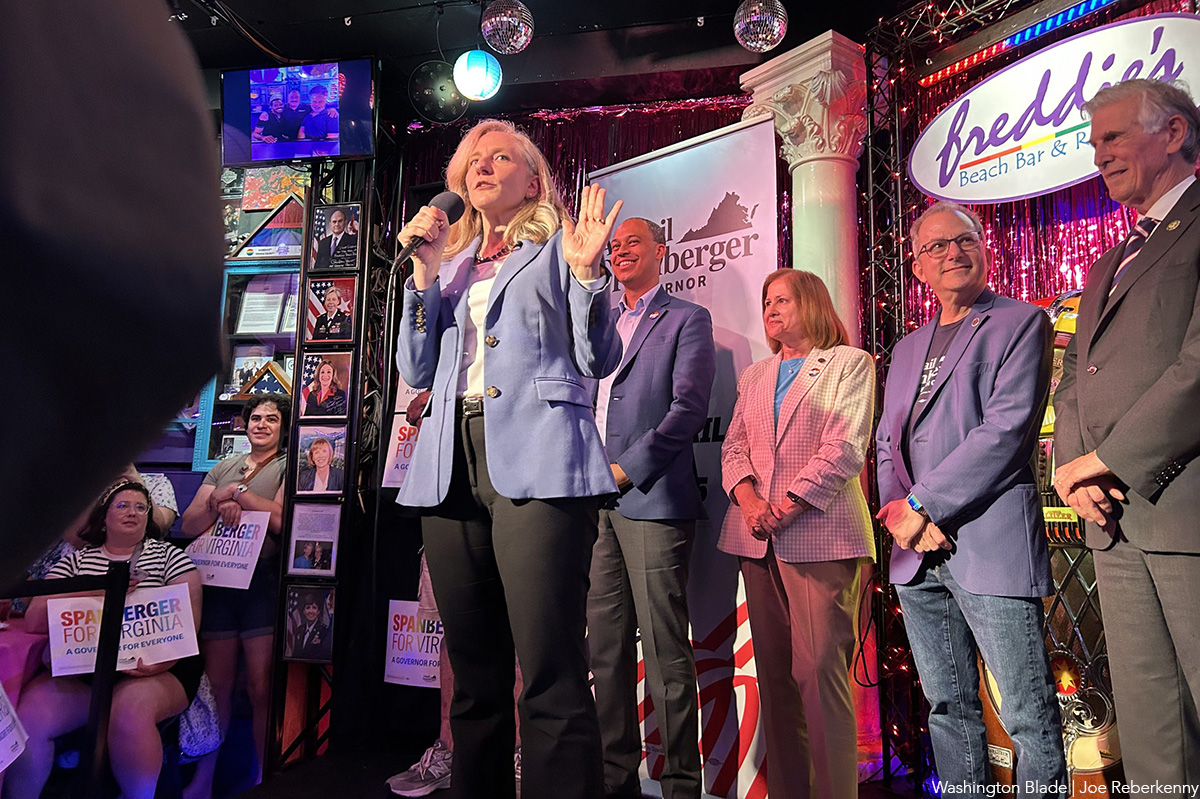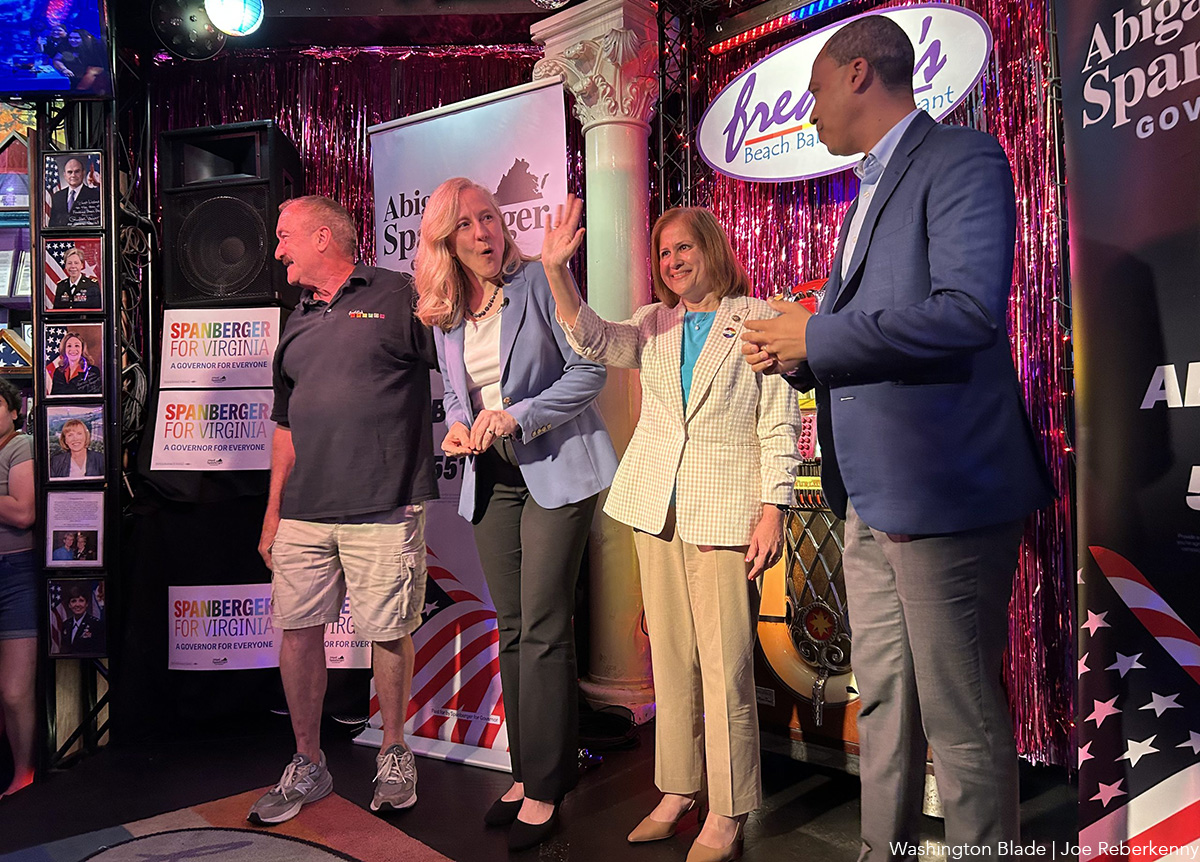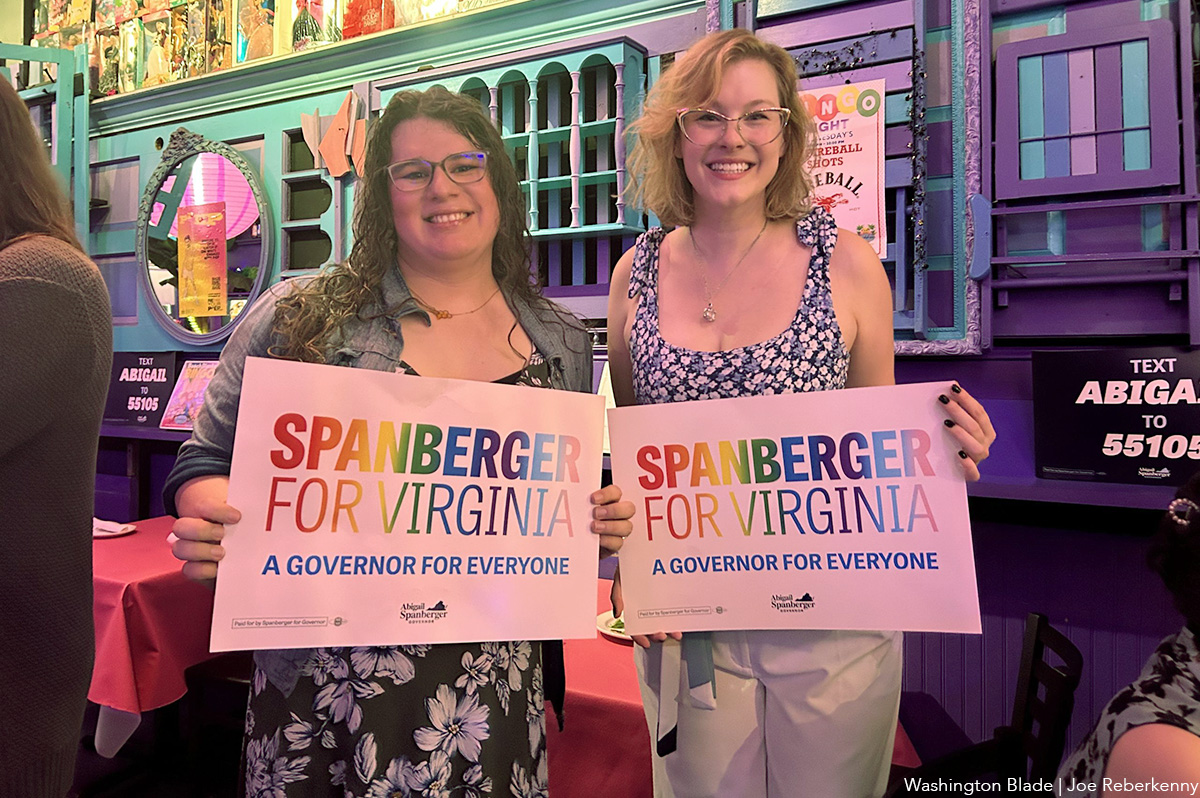Local
D.C. judge rejects ballot measure on gay marriage
Opponents of same-sex marriage in the District of Columbia lost their second court challenge in less than a year Thursday when a Superior Court judge ruled that a voter initiative seeking to ban such marriages cannot be placed on the ballot.
Judge Judith Macaluso ruled that the D.C. Board of Elections & Ethics acted properly in November when it rejected a proposed initiative calling for banning same-sex marriages in the city.
The election board said seeking a gay marriage ban was an impermissible subject for a ballot measure because it would violate the city’s Human Rights Act, which bans discrimination based on sexual orientation.
“Today’s decision affirms the District’s effort to make our city open and inclusive,” said D.C. Mayor Adrian Fenty, who signed a same-sex marriage bill last month shortly after the City Council approved it.
City officials and Capitol Hill observes believe the bill will become law the first week in March, when it’s expected to clear a required congressional review of 30 legislative days.
“Thanks to the Superior Court, this historic legislation is now one crucial step closer to being implemented,“ said D.C. Attorney General Peter Nickles, who filed the city’s court brief opposing the ballot initiative.
“Many District residents have waited decades for full marriage rights,” he said. “Their wait will soon be over.”
The case on which Macaluso ruled, Harry Jackson Jr. v. District of Columbia Board of Elections & Ethics, is named for Bishop Harry Jackson, the Beltsville, Md., minister who is leading efforts to ban same-sex marriage in D.C.
Another Superior Court judge ruled against Jackson last year when he filed papers with the election board for a voter referendum to overturn a separate law that authorized the city to recognize same-sex marriages performed in other jurisdictions.
Similar to Thursday’s ruling, the earlier ruling upheld an election board decision rejecting Jackson’s proposed referendum on grounds that it would violate the city’s Human Rights Act.
Among those who signed on as co-plaintiffs with Jackson in the case decided Thursday were Rev. Walter Fauntroy, the city’s former congressional delegate; Ward 5 Advisory Neighborhood Commissioner Robert King; and Rev. Anthony Evans, a D.C. minister.
Attorneys representing Jackson and the other plaintiffs argued in court papers that the right of citizens to propose initiatives and referenda was established as an amendment to the congressionally approved D.C. City Charter. They noted that the restriction used by the city to disqualify initiatives and referenda that would violate the city’s Human Rights Act was established by a regular law passed by the City Council aimed at implementing the City Charter amendment.
According to Jackson and his attorneys, the Council’s restriction on an initiative or referendum seeking to ban same-sex marriage violates the City Charter, which created the initiative and referenda process without such a restriction.
In her ruling Thursday, Macaluso said the City Charter Amendment in question was passed by the City Council before being ratified by Congress. She said it gave the Council full authority to carry out the initiative and referenda process through implementing legislation.
“The most reasonable interpretation of events is that [the] Council … knew what it intended when it directed itself ‘to adopt such acts as are necessary to carry out the purpose of this [charter amendment ]’and that this intention included protection of minorities from the possibility of discriminatory initiatives,” Macaluso says in her ruling.
“Judge Macaluso applied the law impartially in this case, recognizing the D.C. Council’s right to define the initiative process consistent with the D.C. Charter,” said Tom Williamson, one of a team of attorneys who represented same-sex couples in a friend of the court brief supporting the city’s position in the case.
“The decision upholds the Council’s right to broadly protect human rights for all District residents,” said Williamson, who is with the D.C. law firm Covington & Burling, which is providing pro bono legal counsel to the same-sex couples.
Jackson and his fellow plaintiffs in the case could not be immediately reached for comment. They have said in the past that they would likely appeal a decision against them by Macaluso.
But some legal experts, including Williamson, have said Jackson most likely would not be able to appeal the case beyond the D.C. Court of Appeals to the federal courts, including the Supreme Court, because it doesn’t involve a federal constitutional issue.
Thirty-seven Republican members of the House of Representatives and two GOP U.S. senators had filed a separate friend of the court, or amicus, brief backing Jackson’s position in the case.
The GOP lawmakers are expected to take steps through congressional action later this year to overturn the city’s same-sex marriage bill after it becomes law in March. Same-sex marriage supporters, including national LGBT groups such as the Human Rights Campaign, have said they are hopeful that the Democratic controlled Congress will kill any attempt to overturn the marriage law.
“This second, back-to-back ruling by the D.C. Superior Court is an overwhelming victory for fairness, the rule of law and the protection of all D.C. residents against discrimination,” said Joe Solmonese, HRC’s president. “D.C. has the right to govern itself and make its own laws without the interference of 39 Republican members of Congress more interested in scoring cheap political points than in the everyday lives of D.C. residents.”
Maryland
LGBTQ suicide prevention hotline option is going away. Here’s where else to go in Md.
Changes will take effect July 17

By ANNA RUBENSTEIN | The national suicide prevention hotline will no longer offer specialized support to LGBTQ people, starting July 17, the Trump administration announced last week.
Dialing the hotline at 988 will still be available for crisis support. But callers will no longer be able to reach specific LGBTQ services by pressing Option 3. The change worries advocates because their data shows the LGBTQ community has a disproportionally high suicide rate.
Even after the option ends, here’s how to receive tailored support if you’re in Maryland.
The rest of this article can be found on the Baltimore Banner’s website.
Maryland
Silver Spring holds annual Pride In The Plaza
‘Today means inclusion. It means to build resilience’

Silver Spring’s annual Pride in the Plaza event took place on Sunday to celebrate the LGBTQ community and emphasize inclusion and resilience.
“Today means inclusion. It means to build resilience, love,” Robyn Woods, program and outreach director for Live In Your Truth, which organized the event, said. “I mean, just being surrounded by the community and so many great entrepreneurs, business owners, and just being a part of this whole rainbow coalition that we call the LGBTQIA to be about.”
With the event being her first time organizing for Live In Your Truth, Woods said she felt emotional to see the support and love at the event.
“Some people (are) bringing out their children, their babies, their grandparents,” Woods said. “It’s a lot more allies here than anything else. That type of support to me means so much more than just support from my community; just outside support, inside support, so much support around it, so much love. Everyone’s smiling outside, helping each other.”
Attendees of the event were able to head over to the Family Fun Zone, an air-conditioned Pride Cool Down Lounge, or watch live drag performances in the main stage area.
Along with entertainment and a shaved-ice stand, rows of information tables stood along the plaza, including FreeState Justice, the Washington Spirit, Trans Maryland, Moco Pride Center, and the Heartwood Program, an organization that offers support, therapy, education, and resources to the LGBTQ community.
“I want people to know about our services, and I love what we have to offer,” Jessica Simon, psychotherapist for Heartwood Program’s Gender Wellness Clinic, said. “I (also) want to be part of a celebration with the community, and so it feels good to be here with other people who have something they want to give to the community.”
She added that within today’s political climate, to which she called an “antidote to shame,” it’s important to be celebrating Pride.
“There’s a lot of demonization of LGBTQI people,” Siena Iacuvazzi, facilitator for Maryland Trans Unity, said. “(Pride) is part of the healing process.”
Iacuvazzi said she was taught to be ashamed of who she was growing up, but being a part of a community helped her flourish in the future.
“I was taught how to hate myself. I was taught that I was an abomination to God,” she said. “But being a community is like understanding that there are people who have experienced the same thing, and they’re flourishing. They’re flourishing because they’re willing to stand up for themselves as human beings and discover themselves and understand what’s true for themselves.”
She added that Pride allows for a mutual understanding to take place.
“It’s more of a sense of belonging … and just taking that home and understanding you’re not alone,” Iacuvazzi said. “We’re each taking our own journey — we’re not putting that on each other. It’s just walking away with a sense of belonging and humanity.”
Similar to Iacuvazzi, Woods said she hopes attendees’ biggest takeaways would be family, fun, resilience, and pride.
“Being proud of yourself, being happy for who you are, and representation and how much it matters,” she continued. “And I think all these young people that are walking around here get to see versions of themselves, but older. They get to see so many different lesbian, gay, bisexual, pansexual people that are successful, that are showing love, that care, and it’s not how we’re portrayed in the media. It’s lovely to see it out here. (It’s) like we’re one big old, happy family.”
Virginia
Spanberger touts equality, reproductive rights in Arlington
Democratic Va. gubernatorial nominee made campaign stop at Freddie’s Beach Bar

With the general election heating up and LGBTQ rights under increasing threat nationwide, Virginia gubernatorial candidate Abigail Spanberger brought her “Span Virginia Bus Tour” to Arlington’s Freddie’s Beach Bar for a campaign stop filled with cheers, policy pledges, and community spirit.
Spanberger, who served three terms in the U.S. House of Representatives from 2019 through early 2025 for Virginia’s 7th Congressional District, also served as a federal law enforcement officer specializing in narcotics and money laundering cases, and as a CIA case officer working on counterterrorism and nuclear counterproliferation.
Spanberger is running against Republican nominee Winsome Earle-Sears, the current lieutenant governor of Virginia, who said she was “morally opposed” to a bill protecting marriage equality in the commonwealth.
She was joined by other Democratic candidates and supporters: lieutenant gubernatorial candidate Ghazala Hashmi, attorney general candidate Jay Jones, Virginia state Sen. Adam Ebbin (D-Alexandria), and Congressman Don Beyer.

Freddie’s was packed wall-to-wall with supporters, many of whom wore “Spanberger for Virginia” shirts in the progressive Pride flag colors. In her speech, she made it clear that LGBTQ Virginians’ rights are on the ballot this year.
“I’m so excited to be here, and I am so grateful to the entire staff of Freddy’s for letting us overtake this incredible venue that is not just an awesome place to come together in community, but is a symbol to so many people of joy, of happiness, of community and of celebrating our friends and our neighbors,” Spanberger told the packed restaurant. “It is exciting to be here, and particularly during this Pride month, and particularly as we reflect on the 10-year anniversary of Obergefell and the reality that we still have so much work to do.”
“The reality is there are so many people who still would be inclined to take us backwards,” she said. “In this moment when we see attacks on people’s rights, on people’s humanity, on Virginia, on our economy, on research, on public education, on food security, on health care, on Virginians, on their jobs, on public service and on people — it can get heavy.”
“What it does for me is it makes me want to double down, because once upon a time, when I was talking to my mother about some horror show or sequence of activities coming out of a particular administration, she did not really have the patience to listen to me and said ‘Abigail, let your rage fuel you’ — and the conversation was over. And so I reflect on that, because, in fact, every day there is so much fuel to be had in this world and in this moment.”
One of the points Spanberger continued to emphasize was the importance of steadfast state government officials following the election of President Donald Trump, which has led to rollbacks of LGBTQ and bodily autonomy rights as a result of the conservative-majority U.S. Supreme Court.
“What the past few years have shown us is that a Supreme Court decision, no matter how many years we have celebrated its existence, does not protect us in the long term. And so as governor, I will work to make sure that every protection we can put in place for the dignity, the value, and the equal rights of all Virginians is a priority.”
During her speech, Spanberger highlighted several of the key values driving her campaign — protecting reproductive freedom and human rights, lowering healthcare costs, safeguarding Virginia’s environment, and ensuring that public education is affordable, accessible, and rooted in truth, not politics.
Spanberger went as far as to say that she wants to amend the state’s constitution to remove Section 15-A. “The reality is that in Virginia, we still have a ban in our state constitution on marriage equality. It is of the utmost urgency that we move forward with our constitutional amendment.”
“We will work to ensure that that terrible constitutional amendment, that was put in years ago, is taken out and updated and ensuring that Virginia is reflective in our most essential documents of who we are as a commonwealth, which is an accepting place that celebrates the vibrancy of every single person and recognizes that all Virginians have a place, both in that constitution and in law,” she added.
Following the event, two supporters spoke to the Washington Blade about why they had come out to support Spanberger.
“I came out because I needed to show support for this ticket, because it has been a particularly rough week, but a long few years for our rights in this country, in this state, with this governor, and it’s — we need to flip it around, because queer people need protection,” said Samantha Perez, who lives in Ballston. “Trans people need protection. Trans kids need protection. And it’s not gonna happen with who’s in Richmond right now, and we just need to get it turned around.”

“The whole neighborhood’s here. All our friends are here,” said Annie Styles of Pentagon City. “It means the world to me to take care of each other. That’s what a good community does. That’s not what we’ve had with the Republicans here or across the nation for a really long time. It’s time to show that care. It’s time to make sure that good people are in a position to do good things.”
-

 U.S. Supreme Court4 days ago
U.S. Supreme Court4 days agoSupreme Court upholds ACA rule that makes PrEP, other preventative care free
-

 U.S. Supreme Court4 days ago
U.S. Supreme Court4 days agoSupreme Court rules parents must have option to opt children out of LGBTQ-specific lessons
-

 Congress5 days ago
Congress5 days agoSenate parliamentarian orders removal of gender-affirming care ban from GOP reconciliation bill
-

 District of Columbia5 days ago
District of Columbia5 days agoMan sentenced to 15 years in prison for drug deal that killed two DC gay men










